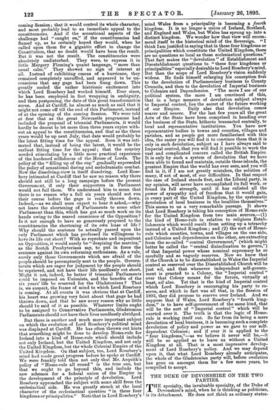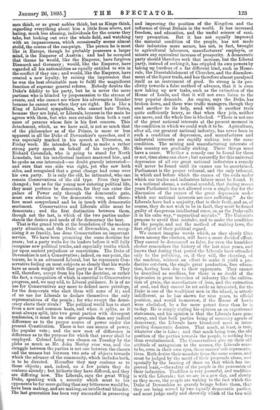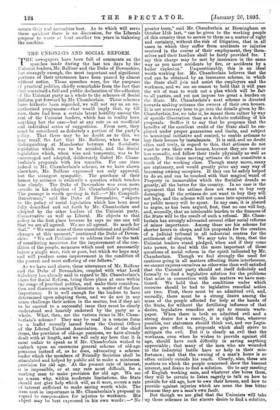THE DUKE OF DEVONSHIRE ON THE TWO PARTIES.
THE specialty, the invaluable specialty, of the Duke of Devonshire's mind, when he is thinking as politician, is its detachment. He does not think as ordinary states- men think, or as great nobles think, but as Kings think, regarding everything about him a little from'above, not hating, much less abusing, individuals for the course they take, but looking out over the whole field, and watching with an impassiveness, which occasionally seems almost stolid, the course of the campaign. The person he is most like in Europe, though he probably possesses a larger mind, is the Emperor of Austria ; and had he occupied that throne he would, like the Emperor, have forgiven Bismarck and Germany ; would, like the Emperor, have regarded all his nationalities as equally entitled to win in the conflict if they can ; and would, like the Emperor, have created a new loyalty, by raising the impression that he was the best obtainable man to fulfil the magnificent function of supreme general referee. Nobody doubts the Duke's fidelity to his party, but he -is never the mere partisan who is blinded. by prepossession to the stream of events, and who cannot see where his adversaries blunder because he cannot see when they are right. He is like a King of Liberal sympathies, who cannot hate Tories, because they are loyal, or Liberals, because in the main he agrees with them, but who sees outside them both a vast mass of persons whose fate is his first concern. This detachment, which, as we have said, is not so much that of the philosopher as of the Prince, is more or less apparent in all the Duke of Devonshire's speeches, and it was especially marked in his speech at Ulverston, on Friday week. He intended, we fancy, to make a rather strong party speech on behalf of his nephew, Mr. Richard. Cavendish, who is going to stand for North Lonsdale, but his intellectual instinct mastered him, and he spoke as one interested—no doubt gravely interested— and sure that one . side was right, yet who saw both sides, and recognised that a great change had come over his own party. It is only the old, he intimated, who can remain Conservatives of the old. type. Even they have changed ; but as for the young now entering political life, they must perforce be democrats, for they can enter the palace of Power only through the democratic gate, must owe election to the democratic vote, and there- fore must comprehend and be in touch with democratic sentiment. Conservatives and Liberals alike must be democrats ; and the first distinction between them, though not the last, is which of the two parties under- stands the desires and needs of the democracy the best.
That is the grand truth at the foundation of the modern party situation, and the Duke of Devonshire, in recog- nising it so frankly, has done Conservatism an important service. We have been preaching the same doctrine for years ; but a party waits for its leaders before it will fully recognise new political truths, and especially truths which jar upon ancient prejudices or convictions. The Duke of Devonshire is not a Conservative ; indeed, on one point, the tenure, he is an advanced. Liberal, but he represents Con- servative feeling on most subjects so closely that his words have as much weight with that party as if he were. They will, therefore, accept from his lips the doctrine, or rather the fact, a recognition of which is essential to-Conservative progress, and, we may add, to Liberal guidance. It is of no use for Conservatives any more to defend mere privilege, for the democrats who elect them will none of it ; and of no use for Liberals to declare themselves the only representatives of the people ; for who except the demo- cracy elects their rivals ? The political world-has to start from a new and common basis, and when_ it splits, as it must always split, into two great parties with divergent tendencies, it must be on other -grounds than any radical difference as to the proper source of power under the present Constitution. There is but one source of power, the popular vote ; and the new root- of difference is difference as to the purpose fdr which that power shall be employed. Colonel Long was chosen -on Tuesday by the plebs as much as Mr. John Morley ever was, and the struggle between the parties is not one between the classes and the masses but between two sets- of objects towards which the advance of the community, which includes both, is to be directed. Hereafter they may coalesce as to those' objects ; and, indeed, on a few points they do coalesce already ; but hitherto they have differed, and they are differing now. The Liberals, says the great Whig Duke, speaking with a serenity which must to his opponents be far more galling than any bitterness would be, have been making, and are making, an intellectual blunder. The last generation has been very successful in- preserving and improving the position of the Kingdom and the influence of Great Britain in the world. It has increased. freedom, and education, and the useful science of sani- tary precaution. But it has not equally improved the material condition of the people, has not made their industries more secure, has not, in fact, brought to agricultural labourers, manufacturers' employes, or miners any equivalent increase of prosperity. A democratic party should therefore seek that increase, but the Liberal party, instead of seeking it, has crippled its own powers by taking up burdens of a far different kind, such as Home- rule, the Disestablishment of Churches, and the disendow- ment of the liquor trade, and has therefore almost paralysed. itself as an instrument of good. So strong is its pro- clivity towards a false method of advance, that it is even now taking up new tasks, such as the extinction of the House of Lords, and that it will not even listen to the true popular demands. An engine, says the Duke, has broken down, and these wise traffic managers, though they send another to its help, send with it another train quite sufficiently heavy, so that when they join, neither can move, and the whole line is blocked. " There is not one of the great national interests at the present moment in the condition in which we could wish it to be. Agriculture, after all, our greatest national industry, has never been in such a condition of depression, and manufactures and industrial interests are rapidly sinking into the same condition. The mining and manufacturing interests of this country are gradually sinking. These things must have a cause. Whether a remedy can be found for them or not, time alone can show ; but assuredly for this universal depression of all our great national industries a remedy will never be found. until its causes can be ascertained. Parliament is the proper tribunal, and the only tribunal, in which and before which the causes of the evils under which our trades and industries labour must be found. It is a national shame, a national scandal, that during recent years Parliament has not allowed even a single day for the discussion of the causes of the great depression under which our national interests are now suffering." As the Liberals have had a majority, that is their fault, and as, of course, they do not wish to be in fault, they must be found guilty of dangerous intellectual error, or, as the Duke calls it in his calm way, " unpractical mistake." The Unionists propose to avoid that mistake, and to make the condition of the people, and not the method of making laws, the first object of their political regard.
We cannot imagine words which, as they slowly filter down among the electors, will have a more decided effect. They cannot be denounced as false, for even the humblest elector remembers the history of the last nine years, and knows that during that period the Liberals have attended only to the polishing, or, if they will, the cleaning, of the machine, without an effort to make it yield a pro- ductive out-turn, the single great production, free educa- tion, having been due to their opponents. They cannot be described as needless, for there is no doubt of the depression in great branches of industry like the cultiva- tion of grain, the manufacture of iron, and the extraction of coal, and they cannot be set aside as interested, for the Duke is one of the wealthiest men in the island, is utterly indifferent, as he has shown for nine years, to official position, and would to-morrow, if the House of Lords were abolished, be a far more potent force than he is to-day. He is simply stating his opinion as an experienced statesman, and his opinion is that the Liberals have gone astray, and that both parties being of necessity agents of democracy, the Liberals have blundered most in inter- preting democratic desires. That much, at least, is true, whatever else is false ; and that much being true, the old position of the parties towards the people, is nothing less than revolutionised. The Conservatives give up their old attitude of antagonism to the masses, the Liberals cease to be, even in their own eyes, those masses' sole representa- tives. Both derive their mandate from the same source, and must be judged by the merit of their proposals alone, and specially by the bearing of those on that which has im- proved least,—the safety of the people in the possession of their industries. Tradition is very powerful, and tradition is with the Liberals ; but we are in a pew day, and slowly as they move, the people are waking to the fact which the Duke of Devonshire so gravely brings before them, that they are being served by two equally democratic parties, and must judge coolly and shrewdly which of the two will secure their real necessities best. As to which will serve them quickest there is no discussion, for the Liberals propose to waste at least another ten years in tinkering the machine.




















































 Previous page
Previous page